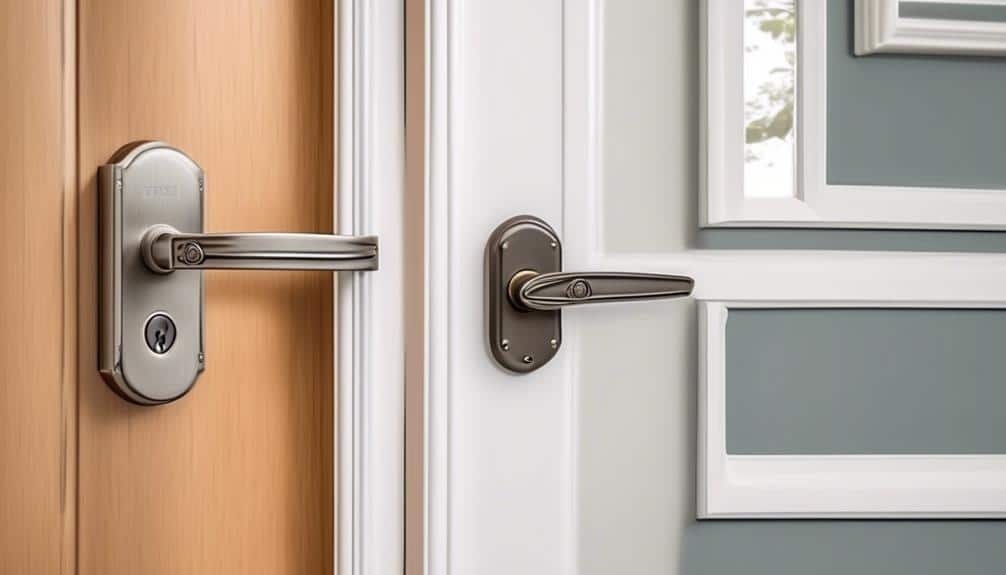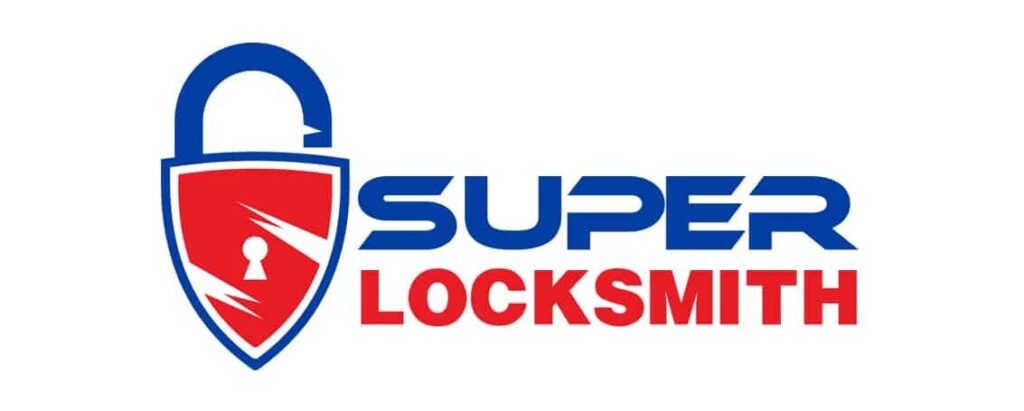When it comes to securing our new homes, we often question which locks are truly the best. Some may argue that any lock would suffice, as long as it keeps intruders out. However, we believe that investing in high-quality locks is essential for ensuring the safety and security of our loved ones and belongings.
In this discussion, we will explore a variety of lock options, from deadbolt locks to smart locks, keyless entry locks to high-security locks, and more. By the end, you'll have a better understanding of which locks are worth considering for your new home.
So, let's dive in and explore the world of home security!
Deadbolt Locks
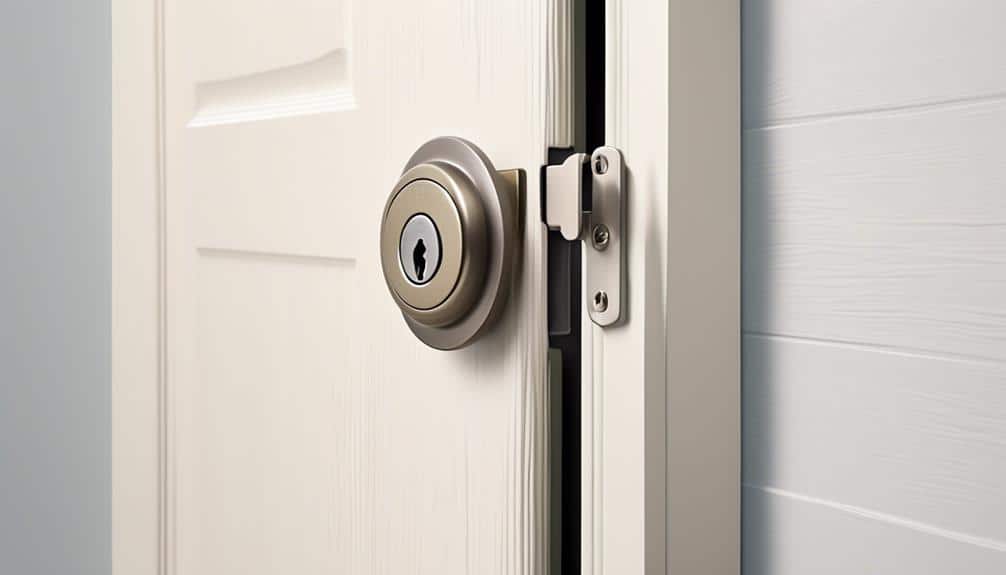
When it comes to securing your new home, deadbolt locks are an essential and highly effective choice. Deadbolt locks provide an added layer of security to your doors, making it much more difficult for burglars to gain entry. These locks are designed to resist forced entry, ensuring the safety of your home and loved ones.
There are two main types of deadbolt locks: single cylinder and double cylinder. Single cylinder deadbolts are the most common and feature a key cylinder on the outside and a thumbturn on the inside. Double cylinder deadbolts, on the other hand, require a key to unlock from both the inside and outside. This type of lock provides increased security, especially for doors with glass panels or windows nearby.
In recent years, smart locks have gained popularity as a high-tech alternative to traditional deadbolt locks. Smart locks offer convenience and added security features such as keyless entry and remote access control. Some smart locks even allow you to monitor and control access to your home from your smartphone.
When choosing a deadbolt lock for your new home, it's important to invest in high security locks. Look for locks that are made from durable materials, have a strong strike plate, and are resistant to picking and drilling. Additionally, consider getting locks that are certified by reputable organizations, such as the American National Standards Institute (ANSI), to ensure their quality and reliability.
Smart Locks
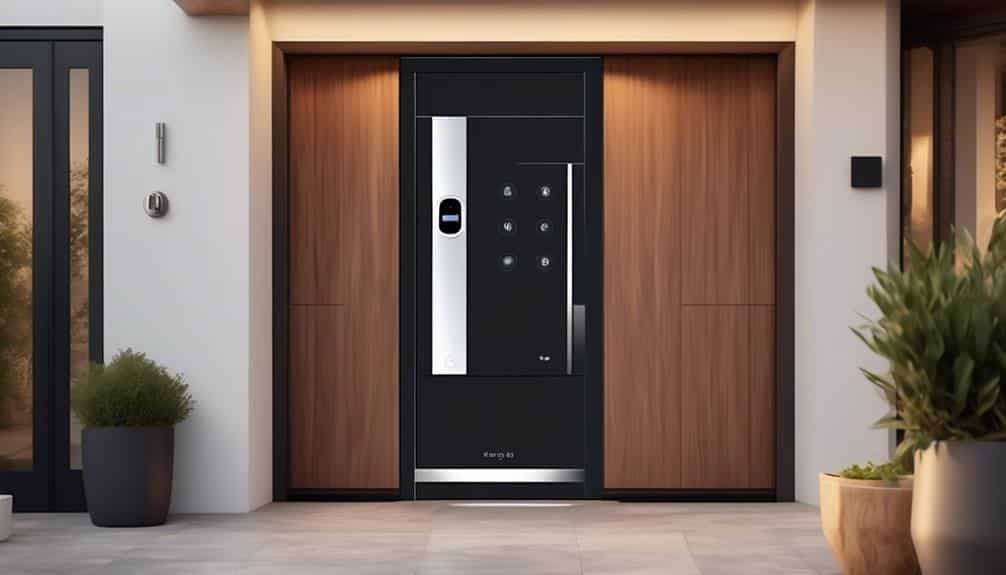
Moving on to the next topic of discussion, let's now explore the world of smart locks as a contemporary and technologically advanced alternative to traditional deadbolt locks.
Smart locks, also known as keyless entry locks, offer convenience, security, and peace of mind for homeowners. Smart locks revolutionize home security by allowing keyless access to your home. With the use of a smartphone app, you can lock and unlock your doors remotely, monitor activity, and even create virtual keys for guests or service providers. This eliminates the need for physical keys and the risk of losing them.
One of the biggest advantages of smart locks is the ability to integrate them with other smart home devices. They can be connected to a home security system, allowing you to receive real-time notifications and remotely control your locks. Some smart locks also have built-in cameras or video doorbells, providing an extra layer of security.
In terms of security, smart locks use advanced encryption and authentication protocols to protect against hacking and unauthorized access. They also offer features such as auto-locking and tamper alerts, enhancing the overall security of your home.
While smart locks may be more expensive than traditional deadbolt locks, their convenience and advanced features make them a worthy investment for any homeowner looking to upgrade their home security system.
Keyless Entry Locks
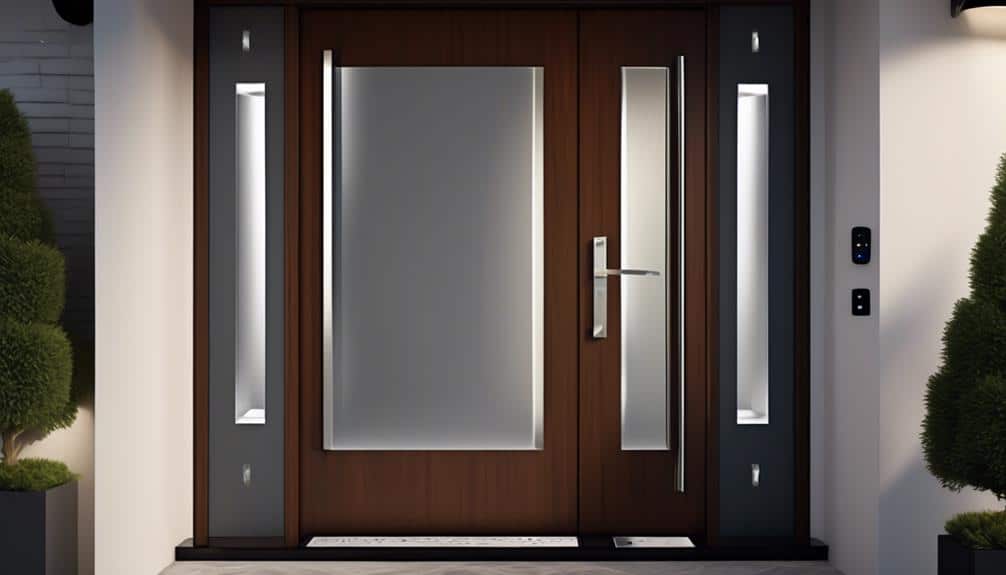
Let's talk about keyless entry locks, one of the best options for new homes.
These locks offer a range of benefits, such as convenience and enhanced security.
Some of the top keyless entry brands to consider include August, Schlage, and Yale.
Benefits of Keyless Entry
Keyless entry locks offer a convenient and secure way to access your home without the need for traditional keys. With keyless entry locks, you no longer have to worry about losing or forgetting your keys. Instead, you can simply enter a personalized code or use a key card or smartphone app to unlock your door. This provides a level of convenience that traditional locks can't match.
In addition to convenience, keyless entry locks also provide enhanced security for your home. Unlike traditional locks, which can be picked or easily tampered with, keyless entry locks use advanced technology to deter break-ins. They often come equipped with features like built-in alarms, tamper detection, and automatic locking. These features make it more difficult for intruders to gain access to your home, giving you peace of mind.
Keyless entry locks are also the future of home security. As technology continues to advance, homeowners are increasingly turning to keyless entry systems for their homes. These systems offer not only convenience and security but also the ability to integrate with other smart home devices. You can control your locks remotely, receive notifications of activity, and even create temporary access codes for guests. With keyless entry systems, you can truly take control of your home security.
Top Keyless Entry Brands
When it comes to keyless entry locks, there are several top brands that offer reliable and innovative options for securing your home. Two popular types of keyless entry locks are remote access locks and Bluetooth enabled locks. With remote access locks, you can control your lock from anywhere using a smartphone or computer. These locks often come with features like keyless entry codes and remote locking and unlocking capabilities. Bluetooth enabled locks, on the other hand, allow you to unlock your door using your smartphone's Bluetooth connection. These locks offer convenience and security, as they can automatically lock and unlock when you approach or leave your home. Some of the top brands for keyless entry locks include Schlage, Kwikset, and Yale. Here is a table showcasing their key features:
| Brand | Remote Access Locks | Bluetooth Enabled Locks |
|---|---|---|
| Schlage | Yes | Yes |
| Kwikset | Yes | Yes |
| Yale | Yes | Yes |
These brands have a variety of options to choose from, allowing you to find the perfect keyless entry lock for your home.
High-Security Locks
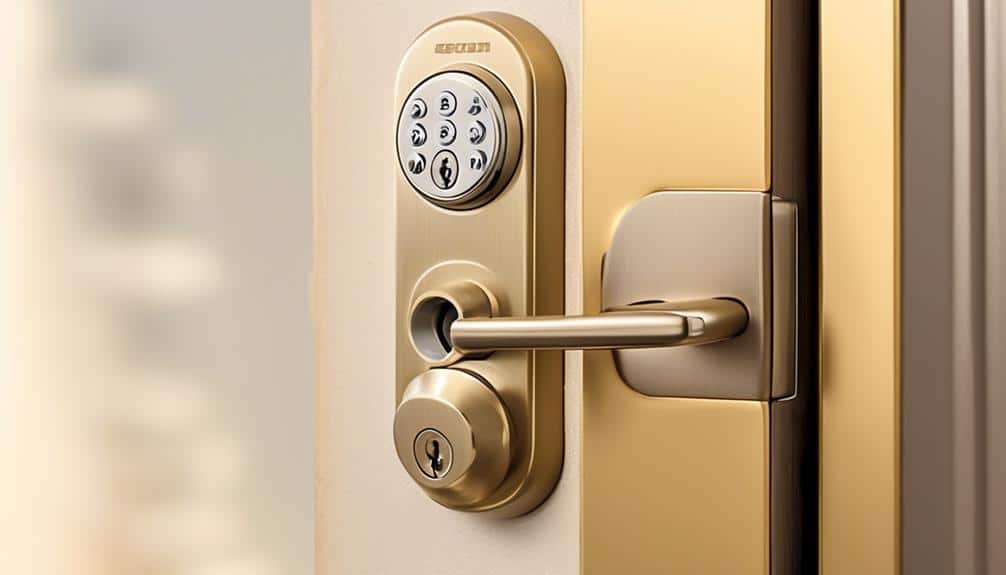
When it comes to high-security locks, there are a few top-notch brands that are worth considering. These brands have a reputation for producing reliable and durable locks that provide an extra level of protection for your home.
In addition to keyless entry options, high-security locks often come with enhanced features such as pick-resistant cylinders and reinforced strike plates, making them a great choice for those looking to maximize the security of their new home.
Top-Notch Lock Brands
To ensure maximum security for your new home, it's important to invest in top-notch lock brands that offer high-security features. When it comes to high-security locks, two top-notch lock brands that come to mind are Yale and Schlage. Both brands are well-known for their quality and reliability.
Yale offers a range of high-security locks that incorporate biometric lock features. These locks use advanced technology, such as fingerprint recognition, to provide an extra layer of security. With biometric locks, you can be confident that only authorized individuals can access your home.
On the other hand, Schlage is renowned for its combination lock security. These locks use a combination of numbers or letters to unlock, making it difficult for intruders to guess the code. Combination locks offer convenience without compromising security.
Investing in top-notch lock brands like Yale and Schlage ensures that your new home is well-protected against potential break-ins. So, choose the best lock brand that suits your needs and enjoy peace of mind knowing that your home is secure.
Keyless Entry Options
Keyless entry options provide a high level of security for your home without the need for traditional keys. Here are some different types of keyless entry systems and their pros and cons:
- Keypad locks: These locks require a PIN code to gain access.
Pros: No need to carry keys, easy to change the code.
Cons: Codes can be easily guessed or observed.
- Biometric locks: These locks use fingerprints or other unique physical characteristics for identification.
Pros: Highly secure, no risk of lost or stolen keys.
Cons: Expensive, may have issues with accuracy.
- Bluetooth locks: These locks connect to your smartphone via Bluetooth for unlocking.
Pros: Convenient, can grant access remotely.
Cons: Relies on battery power, potential for Bluetooth hacking.
- Smart locks: These locks can be controlled remotely using an app or voice commands.
Pros: Versatile, can integrate with other smart home devices.
Cons: Vulnerable to hacking, may have compatibility issues.
- RFID locks: These locks use radio frequency identification to unlock with a key fob or card.
Pros: Easy to use, can disable lost or stolen cards.
Cons: Cards can be lost or stolen, potential for cloning.
When considering keyless entry options, weigh the pros and cons to choose the system that best suits your needs and preferences.
Enhanced Lock Features
Now let's explore the next aspect of home security by diving into the realm of enhanced lock features, specifically high-security locks.
High-security locks provide an added layer of protection for your new home, making it harder for intruders to gain access.
One key feature of these locks is lock customization. High-security locks can be customized to fit your specific needs, with options such as key control, which prevents unauthorized key duplication.
Another important aspect is lock maintenance. Regular maintenance ensures that your high-security locks are functioning properly and remain secure. This includes lubricating the lock mechanism, checking for any signs of wear or damage, and promptly addressing any issues that may arise.
Biometric Locks
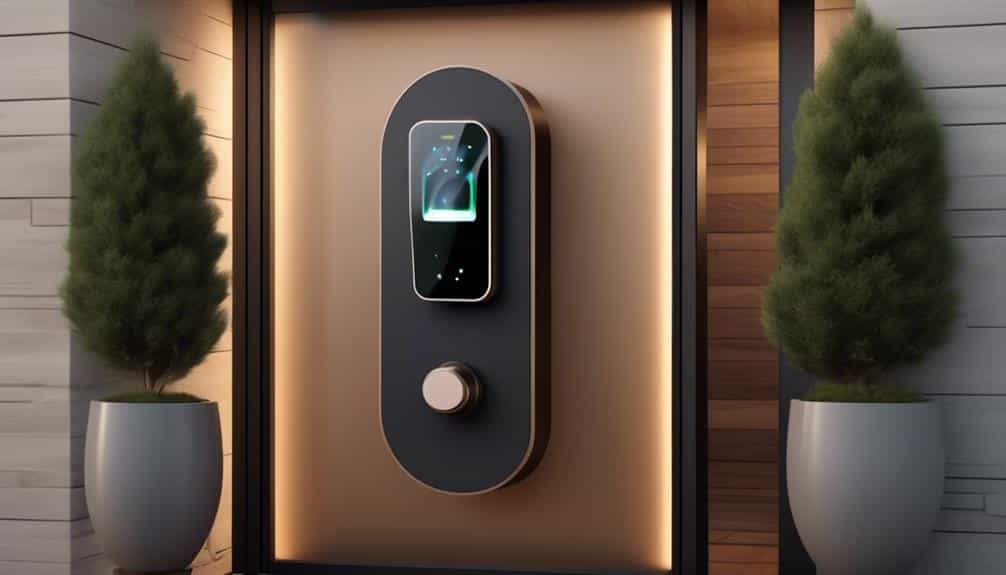
Biometric locks offer a highly secure and convenient option for protecting your new home. With their advanced technology, they provide a more foolproof way of ensuring that only authorized individuals can access your property.
Pros of biometric locks:
- High level of security: Biometric locks use unique physical characteristics, such as fingerprints or iris patterns, to grant access. This makes it nearly impossible for unauthorized individuals to enter your home.
- Convenience: No need to carry keys or remember codes. With a biometric lock, all you need is yourself. This eliminates the risk of losing keys or forgetting codes.
- User-friendly: Biometric locks are easy to use and can be programmed to recognize multiple users, making them ideal for households with multiple family members.
- Tamper-proof: Biometric locks are resistant to tampering, as they require physical presence for authentication. This adds an extra layer of security to your home.
- Audit trail: Some biometric locks provide an audit trail, allowing you to track who accessed your home and when.
Security concerns with biometric locks:
- False acceptance: There's a small chance of false acceptance, where the lock mistakenly grants access to an unauthorized person if the biometric data isn't accurately captured.
- False rejection: On the other hand, false rejection may occur if the biometric data isn't properly recognized, resulting in authorized individuals being denied access.
- Reliability: Biometric locks rely on technology, and like any technology, they can encounter glitches or malfunctions that may hinder their performance.
- Privacy concerns: Biometric data, such as fingerprints or iris scans, can be sensitive information. There's a potential risk of this data being compromised or used without consent.
When considering biometric locks for your new home, it's essential to weigh the pros and cons to make an informed decision that best suits your security needs.
Combination Locks
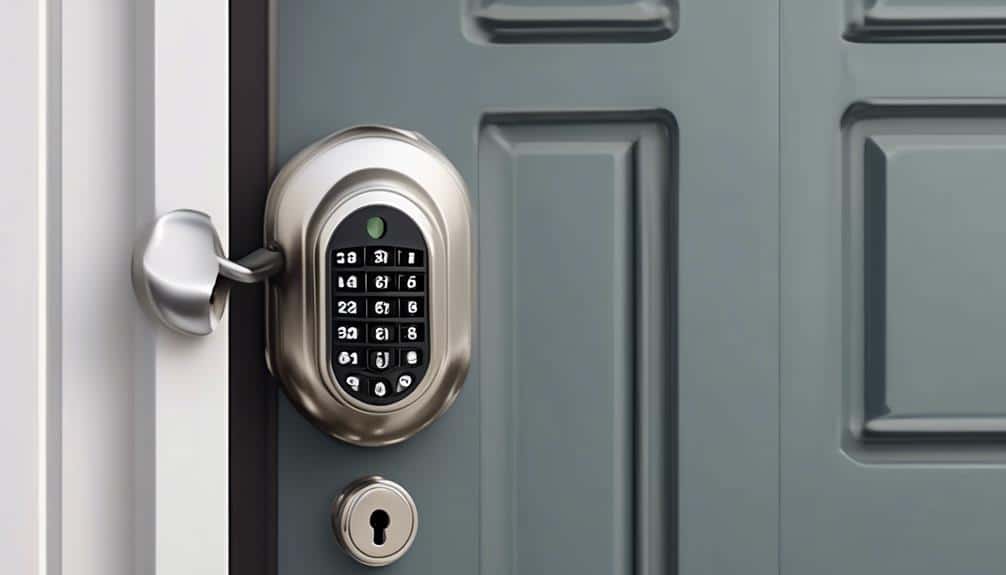
Combination locks offer a reliable and versatile option for securing your new home. These locks provide numerous benefits that make them a popular choice among homeowners. One major advantage of combination locks is that they don't require keys, eliminating the risk of losing or misplacing them. This also means that there's no need to worry about duplicate keys falling into the wrong hands.
There are different types of combination locks available in the market. The most common type is the dial combination lock, which is operated by rotating a dial to enter the correct sequence of numbers. This type of lock is known for its simplicity and durability. Another type is the electronic combination lock, which uses a digital keypad for entering the code. These locks often come with additional features such as built-in alarms and the ability to create multiple user codes.
Combination locks offer convenience and peace of mind, as you can easily change the code whenever needed. They're also resistant to picking and tampering, providing an added layer of security. Additionally, combination locks can be installed on various entry points of your home, such as doors, gates, and safes.
Electronic Locks
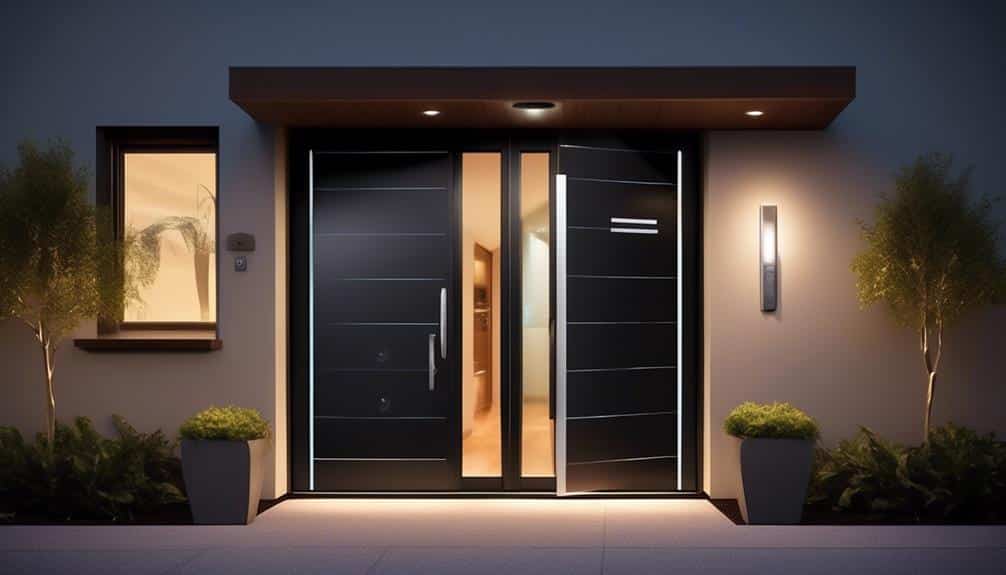
After exploring the benefits of combination locks, it's important to consider the advantages of electronic locks for securing your new home. Electronic locks offer convenience, enhanced security, and peace of mind. Here are some key points to consider when choosing electronic locks for your new home:
- Pros and cons of electronic locks:
- Pros:
- Keyless entry: No need to carry or worry about losing keys.
- Remote access: Control and monitor your locks from anywhere using a smartphone app.
- Enhanced security features: Some electronic locks offer features like fingerprint recognition or keypad entry codes.
- Activity logs: Keep track of who enters and leaves your home.
- Easy integration: Electronic locks can be integrated with other smart home systems.
- Cons:
- Power dependency: Electronic locks require power to function, so you may need backup power sources.
- Potential for hacking: Like any electronic device, there's a slight risk of hacking, although modern electronic locks have advanced security measures.
- Factors to consider when choosing electronic locks for new homes:
- Type of lock: Consider whether you prefer a keypad, biometric, or Bluetooth-enabled lock.
- Compatibility with existing systems: Ensure that the electronic lock can integrate with your current home security system.
- Installation: Determine if you can install the lock yourself or if professional installation is required.
- Warranty and support: Look for reputable brands that offer warranties and reliable customer support.
- Budget: Set a budget and choose a lock that meets your security needs without breaking the bank.
Cylinder Locks
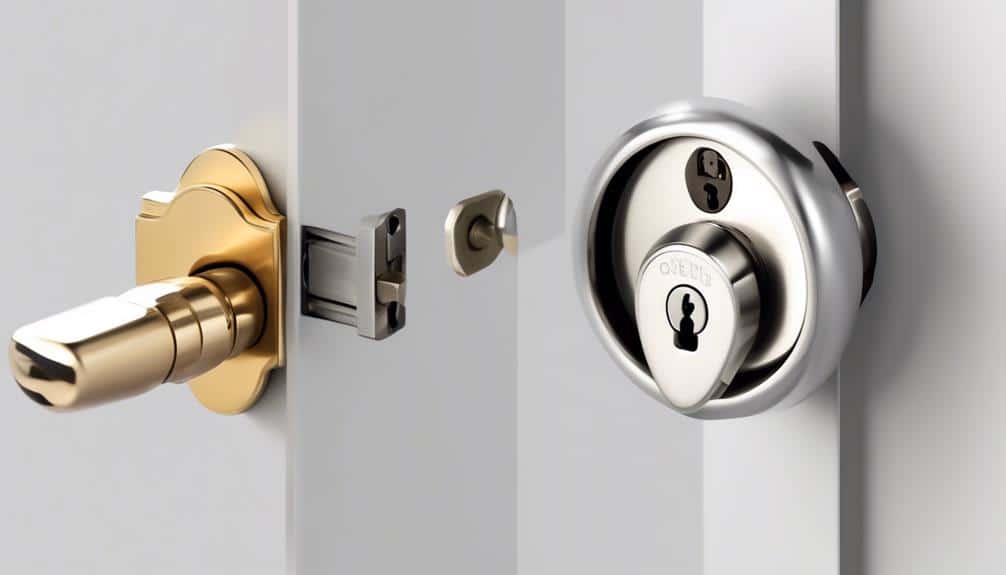
Cylinder locks, also known as pin tumbler locks, are a popular choice for securing new homes due to their reliable and time-tested design. These locks consist of a cylinder that houses the locking mechanism, which is operated using a key.
One of the key advantages of cylinder locks is their ease of installation. They can be easily retrofitted into existing doors, making them a convenient option for homeowners looking to upgrade their security.
Additionally, cylinder locks offer a high level of key control, meaning that duplicate keys can only be made by authorized locksmiths. This provides an added layer of security, as it prevents unauthorized individuals from making copies of your keys without your knowledge.
Furthermore, cylinder locks are highly resistant to picking and bumping, two common methods used by burglars to gain entry. With their durable construction and resistance to tampering, cylinder locks provide homeowners with peace of mind knowing that their homes are well-protected.
Frequently Asked Questions
What Are the Advantages and Disadvantages of Using a Smart Lock for a New Home?
Using a smart lock for a new home has its advantages and disadvantages.
On the plus side, smart locks offer convenience by allowing keyless entry and remote access. They also provide enhanced security features like activity monitoring and alerts.
However, there are potential downsides to consider. Smart locks can be vulnerable to hacking and may require regular software updates. Additionally, power outages or technical glitches could leave you locked out.
It's important to weigh these pros and cons before deciding on a smart lock for your new home.
Are Keyless Entry Locks More Secure Than Traditional Deadbolt Locks?
Keyless entry locks offer convenience and reliability, making them a popular choice for homeowners. While traditional deadbolt locks have been trusted for years, keyless entry locks provide added security features such as keypad codes and fingerprint recognition. These innovative locks eliminate the need for keys, reducing the risk of lock picking or lost keys.
Additionally, keyless entry locks are user-friendly and can be easily programmed for multiple users, making them an excellent option for new homes.
How Do High-Security Locks Provide Extra Protection for New Homes?
High-security locks offer numerous advantages for new homes. They provide extra protection by incorporating advanced features such as anti-pick, anti-drill, and anti-bump mechanisms. These locks are designed to withstand forced entry attempts, making them highly resistant to break-ins.
However, it's important to consider the potential disadvantages of high-security locks, such as higher costs and the need for professional installation. When choosing the best lock for a new home, it's crucial to assess the specific security needs and budget constraints.
What Are the Main Differences Between Biometric Locks and Combination Locks?
Biometric locks and combination locks are two popular options for securing homes.
Biometric locks use unique physical characteristics, like fingerprints or retinal scans, to grant access.
Combination locks, on the other hand, require a specific sequence of numbers or symbols to unlock.
While both types have their advantages, biometric locks are often considered more secure due to their reliance on individual biometric data.
However, it's important to consider factors such as cost and convenience when choosing the best lock for a new home.
Can Electronic Locks Be Easily Hacked or Tampered With?
Electronic locks, like any technology, have vulnerabilities that can be exploited. However, there are ways to protect these locks from hacking or tampering.
It's important to choose a high-quality electronic lock from a reputable manufacturer and ensure it has advanced security features. Regularly updating the lock's firmware and using strong, unique passwords can also enhance its protection.
Additionally, implementing additional layers of security, such as pairing the lock with a home security system, can further safeguard your electronic lock.

